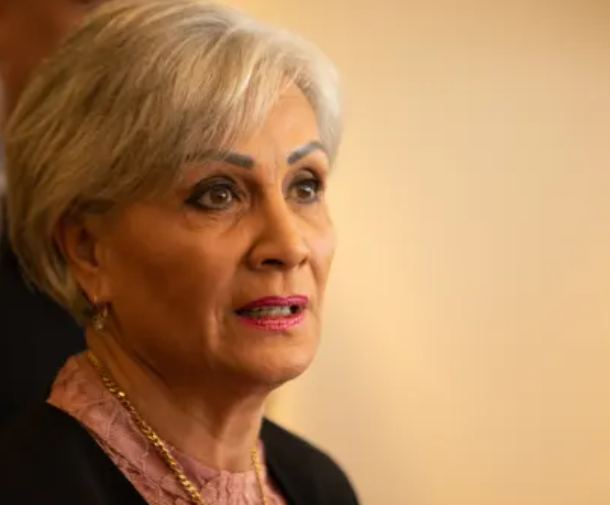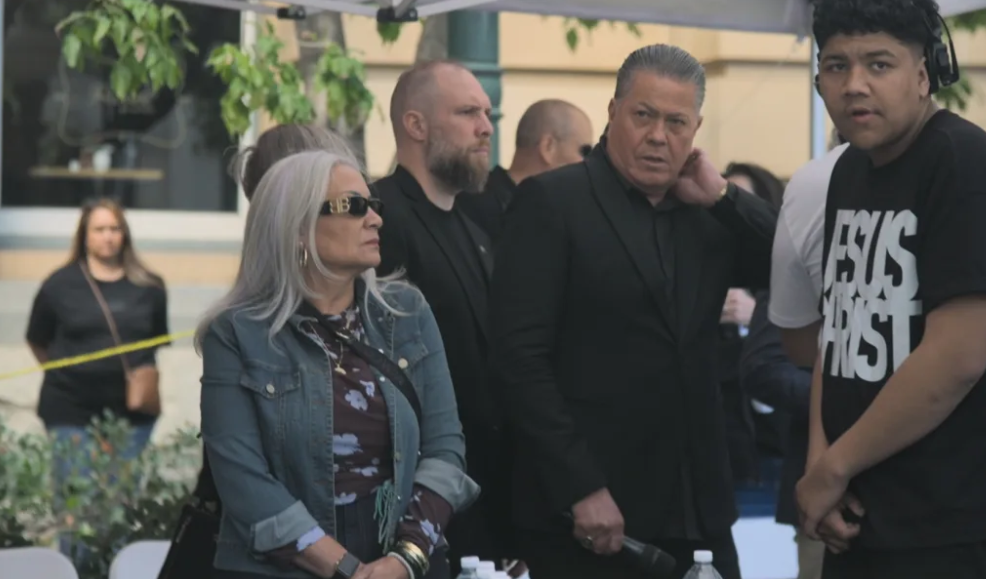By Mihingarangi Forbes and Annabelle Lee-Mather of RNZ
An abuse survivor and former Destiny Church member steps forward to tell her story.
Lynia Morseu-Tol has walked a long way since she left Destiny Church.
She has married, had a child and embraced wairua Māori as she deals with the trauma of violence and sexual harm she endured while growing up in the church.
It has been 16 years since she renounced the teachings of founders Brian and Hannah Tamaki. She decided to speak out about her experiences after seeing church members frighten people in a protest at a children's book event during the Pride Festival earlier this year.
"I think people should know what they're following, who they're following, especially when they're pointing their fingers, saying things like, 'Protect the children'," says Lynia.
"What about me? Was I not a child in your church? Did I not deserve to be protected?"

An extended interview with Lynia appears in the latest episode of the Mata Reports series. She describes her upbringing in the church and dealings with Brian and Hannah Tamaki - Lynia's mother was their personal hairdresser; the abuse she says she suffered from her stepfather; and what she says was the failure of the church to protect her.
Lynia's mother and step-father did not respond to repeated requests for interviews or to answer allegations raised by Lynia.
Brian and Hannah Tamaki would not be interviewed by Mata Reports, but issued a statement via their lawyer saying allegations against them were "outrageous and untrue".
"Both Hannah and Brian work very hard to address and prevent sexual and violent assaults in the community, and they are effective at this," the statement said.
A 'spiritual father'
Lynia says she no longer views Destiny as a church - "I do see it as a cult."
But throughout her childhood, from the age of seven, she was drawn into Destiny.
"When we started at Destiny Church, it was multiple church services a week. It was definitely my mother that had the drive to go to Destiny Church."
She says the church's teachings led her to have much love and respect for Brian Tamaki.
"When you go to that church, everyone that enters it inherently becomes his spiritual child, and that's what he preaches about a lot."
That was especially the case for children from broken families. She says the dynamic presented by Tamaki was: "'You can find what you don't have in me and I will be your spiritual father which means you can come to me for guidance, you can come to me for nurturing or help'.
"And that's how we all saw him. That's how I saw him, that's why I had so much love and respect for him."

"So all those platinum blonde looks that Hannah sported in the early 2000s was at the hands of my mum."
But at home, Lynia says, her life was hell.
"There was never a week where I wasn't hit. And as I got older, the abuse from my stepfather got worse."
She says he would use objects to strike her with. One day she came home from school and saw her stepfather had a metre-long pole painted white.
"He told me to bring the Bible to him and read the verse that was highlighted. And the verse said, 'Thou shalt obey thy parents, mother and father'.
"And he got a pen and he started to carve the Bible verse into the pole. He said, 'Every time you're disciplined you have to read that, so you know exactly what's happening'."
Her siblings used to hide the pole so Lynia wouldn't get hit with it.
"But it just made it worse."
Lynia says when she reached puberty, her stepfather's behaviour around and towards her became sexualised.
"He also attempted to rape me at 14. And my mum just so happened to get home, just on time."
Lynia says she confided in her mother and a church pastor about the alleged assault, but says police were never informed and she never received counselling.
"I honestly don't remember support [being] offered to me."
She moved away from home for a time. After a while, her mother told her she had been counselled and that she had to forgive her husband for the incident "because that's what a wife does".
"She had said: 'Now, honey, this is biblical. I have to forgive him for what he's done to you'," says Lynia.
"I don't think I ever felt more insignificant. I didn't understand how you could let someone touch you [who had] tried doing that to your baby."
Violence at home
Lynia says she stayed away for a while longer, but eventually returned home "because Destiny was everything to me".
However, the incident left her questioning herself.
"I think from that I just kind of questioned my worth, you know? If mum won't fight for me, why would anyone else?"
Back at home, she says, she was violently assaulted at age 16 following a church youth event.
Her stepfather was unhappy about her going, she says, and his anger flared over something unrelated - her mother's hair straightener.
"He just looked at me, and said, 'Don't you f***ing touch that straightener'.
"It was the first time I think I actually had the bravery to say to him, 'You're not my dad. Mum said I can use it'."
She says he threw a hairbrush at her and rushed towards her.
"He picked me up and [threw] me against the gunmetal fireplace that we had in our home and dragged me down the hallway and my mum was yelling at me from the end of the hallway."
Her mum was telling her to run.
This time the police were called and her stepfather was taken to court and charged with assault. He was convicted and sentenced to nine months' supervision and ordered to undergo counselling.
Lynia says she remembers Hannah Tamaki coming to support her.
"She's the only person I ever remember being there. I really thought that she was there to hold my hand and protect me because she believed me. I don't think that was the case. I feel she was there to protect herself and to protect the church."

Lynia's struggle with the church's teachings
As well as the abuse, there was something else which troubled Lynia as she was growing up. She was becoming confused about the church's teachings.
"There were two things that were seen as instantaneous tickets to hell: number one was the taking of your own life because your life is not yours to take; and [number two] was being gay.
"I myself identify as takatāpui.
"As a kid when you know that you don't just like men, it was an identity crisis and a half because on one side you're fighting for your eternity and on the other side you are fighting against [yourself]."
The church's campaign against Ngāti Uenuku, the rainbow community, was another reason which compelled her to speak out.
"You so blatantly point your finger at my people and say that we're hurting [children], saying that trans, gay, lesbian, whatever it might be, are hurting the children.
"But that's not my experience. My experience was being hurt under your roof and I think people deserve to know that because in their heads they're protecting the kids. But what about your kids? What are they going through?"
The Tamakis respond
Brian and Hannah Tamaki issued a statement via their lawyer which read: "These allegations are outrageous and untrue. Their source … is unreliable and clearly motivated to cause unjustified harm.
"Both Hannah and Brian work very hard to address and prevent sexual and violent assaults in the community, and they are effective at this.
"If they receive a complaint of sexual or physical assault, they both support the victim to make a complaint to the police. They remain supportive, as much as that is desired by the victim, through that process and after. They also try to assist victims, with professional support which they also encourage, to be able to move forward in their lives. They do not and have not encouraged any victim to stay with or move back in with an offender. That said they cannot prevent a victim returning to the offender or allowing the offender back into their lives, despite counselling them against that. The reality is that many victims do return to their offender in a family relationship context, and you know this.
"There are many reasons for this including financial ones. It is simply mischievous for you to suggest otherwise or assert blame on Brian and Hannah.
"Otherwise, they will not comment on any specific case or individual.
"Hannah and Brian both report being tired of being the subject of continued unmeritorious media interest and are prepared to take any harmful reporting further, and they will do so."
* Made with the help of Te Māngai Pāho & NZ on Air
Where to get help
For female survivors
Help Wellington, 048016655
Help, Auckland 09 623 1296.
For male survivors
For urgent help: Safe To Talk 0800044334.
If it is an emergency and you feel like you or someone else is at risk, call 111.
Road Forward Trust, Wellington, contact Richard 0211181043
Better Blokes Auckland, 099902553
The Canterbury Men's Centre, 03 3776747
The Male Room, Nelson 035480403
Male Survivors, Waikato 07 8584112
Male Survivors, Otago 0211064598













